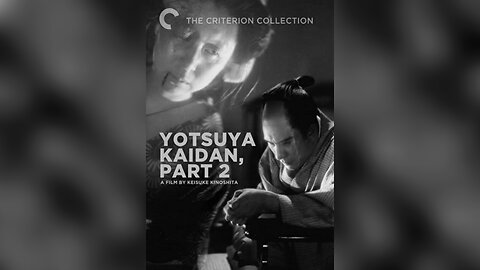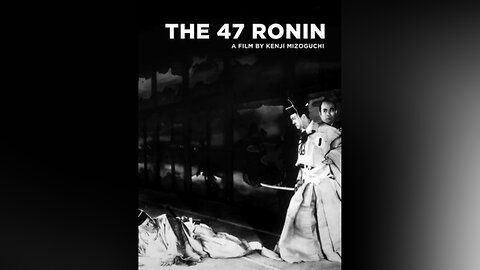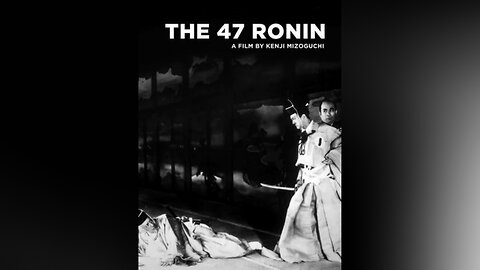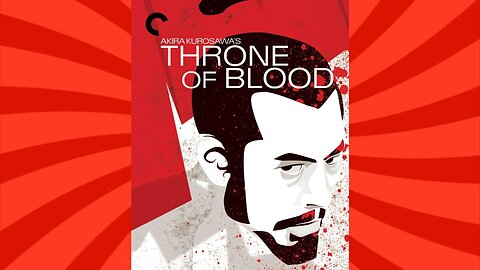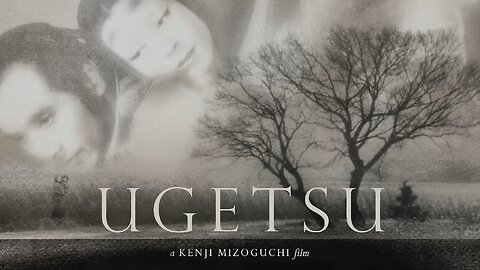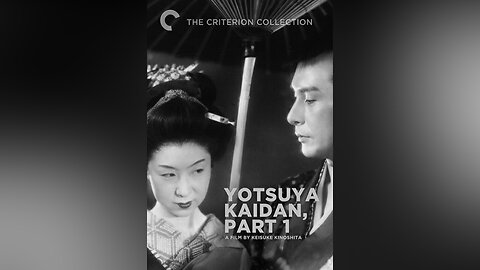
-
Yotsuya Kwaidan/Ghost of Yotsuya - Part 1 (Film 1949 - ENG SUB)
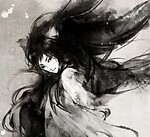 Adaneth - Cinema&TVA 1949 adaptation of a kabuki play written by Tsuruya Nanboku. Directed by Keisuke Kinoshita, written by Eijirô Hisaita, Masaki Kobayashi and Nanboku Tsuruya. Starring; Kinuyo Tanaka, Ken Uehara, Hisako Yamane, Haruko Sugimura, Choko Iida, Osamu Takizawa, Jukichi Uno, Keiji Sada, Aizo Tamashima, Ken Mitsuda. Audio in Japanese with English subtitles (Hardsub). Yotsuya Kaidan, the story of Oiwa and Tamiya Iemon, is a tale of betrayal, murder and ghostly revenge. Arguably the most famous Japanese ghost story of all time, it has been adapted for film over 30 times and continues to be an influence on Japanese horror today. Written in 1825 by Tsuruya Nanboku IV, as a kabuki play, the original title was Tōkaidō Yotsuya Kaidan (Ghost Story of Yotsuya in Tokaido). It is now generally shortened, and loosely translates as Ghost Story of Yotsuya. Historical basis: Nanboku incorporated two sensational and real-life murders into Yotsuya Kaidan, combining fact and fiction in a manner that resonated with audiences. The first involved two servants who had murdered their respective masters. They were caught and executed on the same day. The second murder was from a samurai who discovered his concubine was having an affair with a servant. The samurai had the faithless concubine and servant nailed to a wooden board and thrown into the Kanda River. As the most-adapted Japanese ghost story, the details of Yotsuya Kaidan have been altered over time, often bearing little resemblance to the original kabuki play, and sometimes removing the ghostly element altogether. However, the base story usually remains the same and recognizable. Kinoshita Keisuke version of the story removed the ghostly elements and presented Oiwa as an apparition of her husband's guilty psyche. It was also known as The Phantom of Yotsuya. Part 1: Iemon Tamiya is an impoverished master-less samurai who craves a better life, which he cannot have because of his marriage to Oiwa, who is completely devoted to her husband. Part 2: https://rumble.com/v6s292x-yotsuya-kwaidanghost-of-yotsuya-part-2-film-1949-eng-sub.html136 views
Adaneth - Cinema&TVA 1949 adaptation of a kabuki play written by Tsuruya Nanboku. Directed by Keisuke Kinoshita, written by Eijirô Hisaita, Masaki Kobayashi and Nanboku Tsuruya. Starring; Kinuyo Tanaka, Ken Uehara, Hisako Yamane, Haruko Sugimura, Choko Iida, Osamu Takizawa, Jukichi Uno, Keiji Sada, Aizo Tamashima, Ken Mitsuda. Audio in Japanese with English subtitles (Hardsub). Yotsuya Kaidan, the story of Oiwa and Tamiya Iemon, is a tale of betrayal, murder and ghostly revenge. Arguably the most famous Japanese ghost story of all time, it has been adapted for film over 30 times and continues to be an influence on Japanese horror today. Written in 1825 by Tsuruya Nanboku IV, as a kabuki play, the original title was Tōkaidō Yotsuya Kaidan (Ghost Story of Yotsuya in Tokaido). It is now generally shortened, and loosely translates as Ghost Story of Yotsuya. Historical basis: Nanboku incorporated two sensational and real-life murders into Yotsuya Kaidan, combining fact and fiction in a manner that resonated with audiences. The first involved two servants who had murdered their respective masters. They were caught and executed on the same day. The second murder was from a samurai who discovered his concubine was having an affair with a servant. The samurai had the faithless concubine and servant nailed to a wooden board and thrown into the Kanda River. As the most-adapted Japanese ghost story, the details of Yotsuya Kaidan have been altered over time, often bearing little resemblance to the original kabuki play, and sometimes removing the ghostly element altogether. However, the base story usually remains the same and recognizable. Kinoshita Keisuke version of the story removed the ghostly elements and presented Oiwa as an apparition of her husband's guilty psyche. It was also known as The Phantom of Yotsuya. Part 1: Iemon Tamiya is an impoverished master-less samurai who craves a better life, which he cannot have because of his marriage to Oiwa, who is completely devoted to her husband. Part 2: https://rumble.com/v6s292x-yotsuya-kwaidanghost-of-yotsuya-part-2-film-1949-eng-sub.html136 views -
Yotsuya Kwaidan/Ghost of Yotsuya - Part 2 (Film 1949 - ENG SUB)
 Adaneth - Cinema&TVPart 2: The Yotsuda Phantom, Iemon's apparent success is minimized by his own feelings of guilt, the quickly mounting evidence, and Naosuke's constant hounding.110 views
Adaneth - Cinema&TVPart 2: The Yotsuda Phantom, Iemon's apparent success is minimized by his own feelings of guilt, the quickly mounting evidence, and Naosuke's constant hounding.110 views -
The 47 Ronin/Genroku Chūshingura - Part I (Film 1941)
 Adaneth - Cinema&TVThe 47 Ronin (元禄 忠臣蔵, Genroku Chūshingura, "The Treasury of Loyal Retainers of the Genroku Era") is a black-and-white two-part jidaigeki Japanese film directed by Kenji Mizoguchi, adapted from a play by Seika Mayama. Audio in Japanese with English subtitles. The first part was released on December 1, 1941 with the second part being released on February 11 of the following year. The film wasn't shown in America until the 1970s. The film depicts the legendary forty-seven Ronin and their plot to avenge the death of their lord, Asano Naganori, by killing Kira Yoshinaka, a shogunate official responsible for Asano being forced to commit seppuku. Cast & Characters: Chōjuro Kawarasaki as Ōishi Kuranosuke Kanemon Nakamura as Tominomori Sukeemon Kunitarō Kawarazaki as Isogai Jūrōzaemon Chōemon Bandō as Hara Sōemon Sukezō Sukedakaya as Yoshida Chūzaemon Kikunojo Segawa as Otaka Gengo Utaemon Ichikawa as Tokugawa Ienobu Yoshizaburō Arashi as Asano Naganori Kazutoyo Mimasu as Kira Yoshinaka Tokusaburō Arashi as Okuno Shōgen Masao Shimizu as Katō Akihide Mitsuko Miura as Yosenin97 views
Adaneth - Cinema&TVThe 47 Ronin (元禄 忠臣蔵, Genroku Chūshingura, "The Treasury of Loyal Retainers of the Genroku Era") is a black-and-white two-part jidaigeki Japanese film directed by Kenji Mizoguchi, adapted from a play by Seika Mayama. Audio in Japanese with English subtitles. The first part was released on December 1, 1941 with the second part being released on February 11 of the following year. The film wasn't shown in America until the 1970s. The film depicts the legendary forty-seven Ronin and their plot to avenge the death of their lord, Asano Naganori, by killing Kira Yoshinaka, a shogunate official responsible for Asano being forced to commit seppuku. Cast & Characters: Chōjuro Kawarasaki as Ōishi Kuranosuke Kanemon Nakamura as Tominomori Sukeemon Kunitarō Kawarazaki as Isogai Jūrōzaemon Chōemon Bandō as Hara Sōemon Sukezō Sukedakaya as Yoshida Chūzaemon Kikunojo Segawa as Otaka Gengo Utaemon Ichikawa as Tokugawa Ienobu Yoshizaburō Arashi as Asano Naganori Kazutoyo Mimasu as Kira Yoshinaka Tokusaburō Arashi as Okuno Shōgen Masao Shimizu as Katō Akihide Mitsuko Miura as Yosenin97 views -
Throne Of Blood (Film 1957 - ENG SUB)
 Adaneth - Cinema&TVThrone of Blood (Japanese: 蜘蛛巣城, Hepburn: Kumonosu-jō, lit. 'The Spider Web Castle') is a 1957 Japanese epic jidaigeki film co-written, produced, edited, and directed by Akira Kurosawa, with special effects by Eiji Tsuburaya. Audio in Japanese with English subtitles. The film transposes the plot of English dramatist William Shakespeare's play Macbeth (1606) from Medieval Scotland to feudal Japan, with stylistic elements drawn from Noh drama. The film stars Toshiro Mifune and Isuzu Yamada in the lead roles, modelled on the characters Macbeth and Lady Macbeth. As with the play, the film tells the story of a warrior who assassinates his sovereign at the urging of his ambitious wife. Kurosawa was a fan of the play and intended to make his own adaptation for several years, delaying it after learning of Orson Welles' Macbeth (1948). The film was shot around Mount Fuji and Izu Peninsula. The film was one of the most expensive films ever made in Japan at the time of its release. Despite the change in setting and language and numerous creative liberties, Throne of Blood is often considered one of the best film adaptations of the classic play, and has received much critical praise. The film won two Mainichi Film Awards, including Best Actor for Toshiro Mifune. Cast - Characters - Macbeth Analogue: Toshiro Mifune as Taketoki Washizu (Macbeth) Isuzu Yamada as Lady Asaji Washizu (Lady Macbeth) Takashi Shimura as Noriyasu Odagura (Macduff) Akira Kubo as Yoshiteru Miki (Fleance) Yōichi Tachikawa as Kunimaru Tsuzuki (Malcolm) Minoru Chiaki as Yoshiaki Miki (Banquo) Takamaru Sasaki as Lord Kuniharu Tsuzuki (King Duncan) Chieko Naniwa as Witch (The Three Witches) Kokuten Kōdō as First General Sachio Sakai as Washizu's samurai Yū Fujiki as Washizu's samurai Kichijirō Ueda as Washizu's workman Takeshi Katō as Tsuzuki's samurai Shōbun Inoue as Tsuzuki's messenger Asao Koike as Tsuzuki's messenger Eiko Miyoshi as Senior lady-in-waiting Isao Kimura as Messenger (Phantom) Seiji Miyaguchi as Messenger (Phantom)142 views 3 comments
Adaneth - Cinema&TVThrone of Blood (Japanese: 蜘蛛巣城, Hepburn: Kumonosu-jō, lit. 'The Spider Web Castle') is a 1957 Japanese epic jidaigeki film co-written, produced, edited, and directed by Akira Kurosawa, with special effects by Eiji Tsuburaya. Audio in Japanese with English subtitles. The film transposes the plot of English dramatist William Shakespeare's play Macbeth (1606) from Medieval Scotland to feudal Japan, with stylistic elements drawn from Noh drama. The film stars Toshiro Mifune and Isuzu Yamada in the lead roles, modelled on the characters Macbeth and Lady Macbeth. As with the play, the film tells the story of a warrior who assassinates his sovereign at the urging of his ambitious wife. Kurosawa was a fan of the play and intended to make his own adaptation for several years, delaying it after learning of Orson Welles' Macbeth (1948). The film was shot around Mount Fuji and Izu Peninsula. The film was one of the most expensive films ever made in Japan at the time of its release. Despite the change in setting and language and numerous creative liberties, Throne of Blood is often considered one of the best film adaptations of the classic play, and has received much critical praise. The film won two Mainichi Film Awards, including Best Actor for Toshiro Mifune. Cast - Characters - Macbeth Analogue: Toshiro Mifune as Taketoki Washizu (Macbeth) Isuzu Yamada as Lady Asaji Washizu (Lady Macbeth) Takashi Shimura as Noriyasu Odagura (Macduff) Akira Kubo as Yoshiteru Miki (Fleance) Yōichi Tachikawa as Kunimaru Tsuzuki (Malcolm) Minoru Chiaki as Yoshiaki Miki (Banquo) Takamaru Sasaki as Lord Kuniharu Tsuzuki (King Duncan) Chieko Naniwa as Witch (The Three Witches) Kokuten Kōdō as First General Sachio Sakai as Washizu's samurai Yū Fujiki as Washizu's samurai Kichijirō Ueda as Washizu's workman Takeshi Katō as Tsuzuki's samurai Shōbun Inoue as Tsuzuki's messenger Asao Koike as Tsuzuki's messenger Eiko Miyoshi as Senior lady-in-waiting Isao Kimura as Messenger (Phantom) Seiji Miyaguchi as Messenger (Phantom)142 views 3 comments -
Kwaidan (Film 1964 - ENG SUB)
 Adaneth - Cinema&TVKwaidan is a 1964 Japanese anthology horror film directed by Masaki Kobayashi. It is based on stories from Lafcadio Hearn's collections of Japanese folk tales, mainly Kwaidan: Stories and Studies of Strange Things (1904), for which it is named. Audio in Japanese with English subtitles (Click on cc for subtitles). The film consists of four separate and unrelated stories. Kwaidan is an archaic transliteration of the term kaidan, meaning "ghost story". Receiving critical acclaim, the film won the Special Jury Prize at the 1965 Cannes Film Festival, and received an Academy Award nomination for Best Foreign Language Film. In Japan, Yoko Mizuki won the Kinema Junpo award for Best Screenplay. It also won awards for Best Cinematography and Best Art Direction at the Mainichi Film Concours. - "The Black Hair" (黒髪, Kurokami) is adapted from "The Reconciliation" and "The Corpse Rider", which appeared in Hearn's collection Shadowings (1900). - "The Woman of the Snow" (雪女, Yukionna) is an adaptation from Hearn's Kwaidan: Stories and Studies of Strange Things (1903). - "Hoichi the Earless" (耳無し芳一の話, Miminashi Hōichi no Hanashi) is also adapted from Hearn's Kwaidan (though it incorporates aspects of The Tale of the Heike that are mentioned, but never translated, in Hearn's book). - "In a Cup of Tea" (茶碗の中, Chawan no Naka) is adapted from Hearn's Kottō: Being Japanese Curios, with Sundry Cobwebs (1902). Cast & Characters - Kurokami: Michiyo Aratama as First Wife Misako Watanabe as Second Wife Rentarō Mikuni as Husband Kenjiro Ishiyama as Father Ranko Akagi as Mother Cast & Characters - Yuki-Onna: Tatsuya Nakadai as Minokichi Keiko Kishi as the Yuki-Onna Yūko Mochizuki as Minokichi's mother Kin Sugai as Village woman Noriko Sengoku as Village woman Cast & Characters - Miminashi Hōichi no Hanashi: Katsuo Nakamura as Hoichi Tetsurō Tamba as Warrior Takashi Shimura as Head priest Yoichi Hayashi as Minamoto no Yoshitsune Kazuo Kitamura as Taira no Tomomori Yōsuke Kondō as Benkei Cast & Characters - Chawan no naka: Haruko Sugimura as Madame Osamu Takizawa as Author / Narrator Nakamura Ganjirō II as Publisher Noboru Nakaya as Shikibu Heinai Seiji Miyaguchi as Old man Kei Satō as Ghost samurai200 views 2 comments
Adaneth - Cinema&TVKwaidan is a 1964 Japanese anthology horror film directed by Masaki Kobayashi. It is based on stories from Lafcadio Hearn's collections of Japanese folk tales, mainly Kwaidan: Stories and Studies of Strange Things (1904), for which it is named. Audio in Japanese with English subtitles (Click on cc for subtitles). The film consists of four separate and unrelated stories. Kwaidan is an archaic transliteration of the term kaidan, meaning "ghost story". Receiving critical acclaim, the film won the Special Jury Prize at the 1965 Cannes Film Festival, and received an Academy Award nomination for Best Foreign Language Film. In Japan, Yoko Mizuki won the Kinema Junpo award for Best Screenplay. It also won awards for Best Cinematography and Best Art Direction at the Mainichi Film Concours. - "The Black Hair" (黒髪, Kurokami) is adapted from "The Reconciliation" and "The Corpse Rider", which appeared in Hearn's collection Shadowings (1900). - "The Woman of the Snow" (雪女, Yukionna) is an adaptation from Hearn's Kwaidan: Stories and Studies of Strange Things (1903). - "Hoichi the Earless" (耳無し芳一の話, Miminashi Hōichi no Hanashi) is also adapted from Hearn's Kwaidan (though it incorporates aspects of The Tale of the Heike that are mentioned, but never translated, in Hearn's book). - "In a Cup of Tea" (茶碗の中, Chawan no Naka) is adapted from Hearn's Kottō: Being Japanese Curios, with Sundry Cobwebs (1902). Cast & Characters - Kurokami: Michiyo Aratama as First Wife Misako Watanabe as Second Wife Rentarō Mikuni as Husband Kenjiro Ishiyama as Father Ranko Akagi as Mother Cast & Characters - Yuki-Onna: Tatsuya Nakadai as Minokichi Keiko Kishi as the Yuki-Onna Yūko Mochizuki as Minokichi's mother Kin Sugai as Village woman Noriko Sengoku as Village woman Cast & Characters - Miminashi Hōichi no Hanashi: Katsuo Nakamura as Hoichi Tetsurō Tamba as Warrior Takashi Shimura as Head priest Yoichi Hayashi as Minamoto no Yoshitsune Kazuo Kitamura as Taira no Tomomori Yōsuke Kondō as Benkei Cast & Characters - Chawan no naka: Haruko Sugimura as Madame Osamu Takizawa as Author / Narrator Nakamura Ganjirō II as Publisher Noboru Nakaya as Shikibu Heinai Seiji Miyaguchi as Old man Kei Satō as Ghost samurai200 views 2 comments -
Dolls (Film 2002-ENG SUB)
 Adaneth - Cinema&TVDolls is a 2002 Japanese film written, edited and directed by Japanese director Takeshi Kitano. A highly stylized art film, Dolls is part of Kitano's non-crime film oeuvre, like 1991's A Scene at the Sea, and unlike most of his other films, he does not act in it. The film has been praised for its cinematography (Katsumi Yanagishima) and features costumes by Yohji Yamamoto. The film features three primary sets of characters, each within their own distinct story. These stories do have some incidental visual cross-over with each other in the film, but are mostly separate. The first story is the one on which the film centers. The film leads into it by opening with a performance of Bunraku theatre, and closes with a shot of dolls from the same. The performance is that of "The Courier for Hell" by Chikamatsu Monzaemon, and it alludes to themes that reappear later in the film. Because the rest of the film itself (as Kitano himself has said) can be treated as Bunraku in film form, the film is quite symbolic. In some cases, it is not clear whether a particular scene is meant to be taken literally. The film is also not in strict chronological order, but there is a strong visual emphasis on the changing of the seasons and the bonds of love over the progression of time (Matsumoto and Sawako spend most of the film physically connected by a red rope). Cast & Characters: Miho Kanno as Sawako Hidetoshi Nishijima as Matsumoto Tatsuya Mihashi as Hiro, the boss Kanji Tsuda as young Hiro Chieko Matsubara as Ryoko, the woman in the park Yūko Daike as young Ryoko Kyoko Fukada as Haruna Yamaguchi, the pop star Tsutomu Takeshige as Nukui, the fan Kayoko Kishimoto as Haruna's aunt Ren Osugi as Haruna's manager108 views 2 comments
Adaneth - Cinema&TVDolls is a 2002 Japanese film written, edited and directed by Japanese director Takeshi Kitano. A highly stylized art film, Dolls is part of Kitano's non-crime film oeuvre, like 1991's A Scene at the Sea, and unlike most of his other films, he does not act in it. The film has been praised for its cinematography (Katsumi Yanagishima) and features costumes by Yohji Yamamoto. The film features three primary sets of characters, each within their own distinct story. These stories do have some incidental visual cross-over with each other in the film, but are mostly separate. The first story is the one on which the film centers. The film leads into it by opening with a performance of Bunraku theatre, and closes with a shot of dolls from the same. The performance is that of "The Courier for Hell" by Chikamatsu Monzaemon, and it alludes to themes that reappear later in the film. Because the rest of the film itself (as Kitano himself has said) can be treated as Bunraku in film form, the film is quite symbolic. In some cases, it is not clear whether a particular scene is meant to be taken literally. The film is also not in strict chronological order, but there is a strong visual emphasis on the changing of the seasons and the bonds of love over the progression of time (Matsumoto and Sawako spend most of the film physically connected by a red rope). Cast & Characters: Miho Kanno as Sawako Hidetoshi Nishijima as Matsumoto Tatsuya Mihashi as Hiro, the boss Kanji Tsuda as young Hiro Chieko Matsubara as Ryoko, the woman in the park Yūko Daike as young Ryoko Kyoko Fukada as Haruna Yamaguchi, the pop star Tsutomu Takeshige as Nukui, the fan Kayoko Kishimoto as Haruna's aunt Ren Osugi as Haruna's manager108 views 2 comments -
Ugetsu (Film 1953-ENG SUB)
 Adaneth - Cinema&TVUgetsu, also known as Tales of Ugetsu or Ugetsu Monogatari (lit. "Rain-moon tales"), is a 1953 Japanese historical drama and fantasy film directed by Kenji Mizoguchi starring Masayuki Mori and Machiko Kyō. It is based on two stories in Ueda Akinari's 1776 book of the same name, combining elements of the jidaigeki (period drama) genre with a ghost story. Audio in Japanese with English subtitles. Drawing from Ueda's tales "The House in the Thicket" and "The Lust of the White Serpent", the film is set in Japan's civil war torn Azuchi–Momoyama period (1568–1600). In a small rural community, a potter leaves his wife and young son behind to make money selling pottery and ends up being seduced by a spirit that makes him forget all about his family. A subplot, inspired by Guy de Maupassant's 1883 short story "How He Got the Legion of Honor" ("Décoré !"), involves his brother-in-law, who dreams of becoming a samurai and chases this goal at the unintended expense of his wife. The film won the Silver Lion Award at the 1953 Venice Film Festival and other honours. Ugetsu is one of Mizoguchi's most celebrated films, regarded by critics as a masterpiece of Japanese cinema, credited with simultaneously helping to popularize Japanese cinema in the West and influencing later Japanese film. Cast & Characters: Machiko Kyō as Lady Wakasa Mitsuko Mito as Ohama Kinuyo Tanaka as Miyagi Masayuki Mori as Genjūrō Eitaro Ozawa as Tōbei (as Sakae Ozawa) Ichisaburo Sawamura as Genichi Kikue Mōri as Ukon, Lady Wakasa's Nurse Ryōsuke Kagawa as Village Master Eigoro Onoe as Knight Saburo Date as Vassal Sugisaku Aoyama as Old Priest Reiko Kongo as an Old Woman in Brothel Shozo Nanbu as Shinto Priest Ichirō Amano as Boatsman Kichijirō Ueda as Shop Owner Teruko Omi as Prostitute Keiko Koyanagi as Prostitute Mitsusaburō Ramon as Captain of Tamba Soldiers Jun Fujikawa as Lost Soldier Ryuuji Fukui as Lost Soldier Masayoshi Kikuno as Soldier Hajime Koshikawa Sugisaka Koyama as High Priest Ryuzaburo Mitsuoka as Soldier137 views 2 comments
Adaneth - Cinema&TVUgetsu, also known as Tales of Ugetsu or Ugetsu Monogatari (lit. "Rain-moon tales"), is a 1953 Japanese historical drama and fantasy film directed by Kenji Mizoguchi starring Masayuki Mori and Machiko Kyō. It is based on two stories in Ueda Akinari's 1776 book of the same name, combining elements of the jidaigeki (period drama) genre with a ghost story. Audio in Japanese with English subtitles. Drawing from Ueda's tales "The House in the Thicket" and "The Lust of the White Serpent", the film is set in Japan's civil war torn Azuchi–Momoyama period (1568–1600). In a small rural community, a potter leaves his wife and young son behind to make money selling pottery and ends up being seduced by a spirit that makes him forget all about his family. A subplot, inspired by Guy de Maupassant's 1883 short story "How He Got the Legion of Honor" ("Décoré !"), involves his brother-in-law, who dreams of becoming a samurai and chases this goal at the unintended expense of his wife. The film won the Silver Lion Award at the 1953 Venice Film Festival and other honours. Ugetsu is one of Mizoguchi's most celebrated films, regarded by critics as a masterpiece of Japanese cinema, credited with simultaneously helping to popularize Japanese cinema in the West and influencing later Japanese film. Cast & Characters: Machiko Kyō as Lady Wakasa Mitsuko Mito as Ohama Kinuyo Tanaka as Miyagi Masayuki Mori as Genjūrō Eitaro Ozawa as Tōbei (as Sakae Ozawa) Ichisaburo Sawamura as Genichi Kikue Mōri as Ukon, Lady Wakasa's Nurse Ryōsuke Kagawa as Village Master Eigoro Onoe as Knight Saburo Date as Vassal Sugisaku Aoyama as Old Priest Reiko Kongo as an Old Woman in Brothel Shozo Nanbu as Shinto Priest Ichirō Amano as Boatsman Kichijirō Ueda as Shop Owner Teruko Omi as Prostitute Keiko Koyanagi as Prostitute Mitsusaburō Ramon as Captain of Tamba Soldiers Jun Fujikawa as Lost Soldier Ryuuji Fukui as Lost Soldier Masayoshi Kikuno as Soldier Hajime Koshikawa Sugisaka Koyama as High Priest Ryuzaburo Mitsuoka as Soldier137 views 2 comments -
Yokihi/Princess Yang Kwei Fei (Film 1955)
 Adaneth - Cinema&TVYokihi (English Title: Princess Yang Kwei Fei) is a 1955 Japanese historical film directed by Kenji Mizoguchi. Audio in Japanese with English subtitles. In eighth century China, the Emperor is grieving over the death of his wife. The Yang family wants to provide the Emperor with a consort so that they may consolidate their influence over the court. General An Lushan finds a distant relative working in their kitchen whom they groom to present to the Emperor. The Emperor falls in love with her and she becomes the Princess Yang Kwei-fei. The Yangs are then appointed important ministers, though An Lushan is not given the court position he covets. The ministers misuse their power so much that there is a popular revolt against the Yangs, fueled by An Lushan. The film is based on the story of Yang Yuhuan, often known as Yang Guifei (with Guifei being the highest rank for imperial consorts during her time), and known briefly by the Taoist nun name Taizhen. She was the beloved consort of Emperor Xuanzong of Tang during his later years. She is known as one of the Four Beauties of ancient China. In Japanese, she is known as Yōkihi. Cast & Characters: Machiko Kyō as Princess Yang Kwei Fei Masayuki Mori as Emperor Xuan Zong Sō Yamamura as An Lushan Eitarō Ozawa as Yang Kuo-chung Isao Yamagata as Yang Hsien Yōko Minamida as Hung-tao Noboru Kiritachi as Cuihua Chieko Murata as Lu-hua Michiko Ai as Honghua Eitarō Shindō as Kao Li-hsi Tatsuya Ishiguro as Li Lin-fu Bontarō Miake as Chen-Hsuan-li Haruko Sugimura as Princess Yen-chun Osamu Maruyama as Li Kuei-nien Sachiko Murase as Chengfei Kinzō Shin as chamberlain100 views
Adaneth - Cinema&TVYokihi (English Title: Princess Yang Kwei Fei) is a 1955 Japanese historical film directed by Kenji Mizoguchi. Audio in Japanese with English subtitles. In eighth century China, the Emperor is grieving over the death of his wife. The Yang family wants to provide the Emperor with a consort so that they may consolidate their influence over the court. General An Lushan finds a distant relative working in their kitchen whom they groom to present to the Emperor. The Emperor falls in love with her and she becomes the Princess Yang Kwei-fei. The Yangs are then appointed important ministers, though An Lushan is not given the court position he covets. The ministers misuse their power so much that there is a popular revolt against the Yangs, fueled by An Lushan. The film is based on the story of Yang Yuhuan, often known as Yang Guifei (with Guifei being the highest rank for imperial consorts during her time), and known briefly by the Taoist nun name Taizhen. She was the beloved consort of Emperor Xuanzong of Tang during his later years. She is known as one of the Four Beauties of ancient China. In Japanese, she is known as Yōkihi. Cast & Characters: Machiko Kyō as Princess Yang Kwei Fei Masayuki Mori as Emperor Xuan Zong Sō Yamamura as An Lushan Eitarō Ozawa as Yang Kuo-chung Isao Yamagata as Yang Hsien Yōko Minamida as Hung-tao Noboru Kiritachi as Cuihua Chieko Murata as Lu-hua Michiko Ai as Honghua Eitarō Shindō as Kao Li-hsi Tatsuya Ishiguro as Li Lin-fu Bontarō Miake as Chen-Hsuan-li Haruko Sugimura as Princess Yen-chun Osamu Maruyama as Li Kuei-nien Sachiko Murase as Chengfei Kinzō Shin as chamberlain100 views
